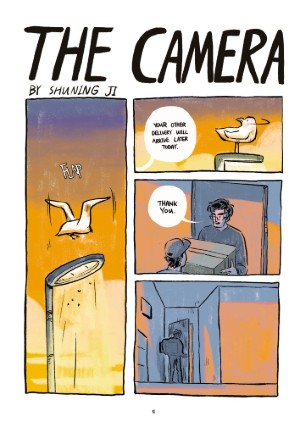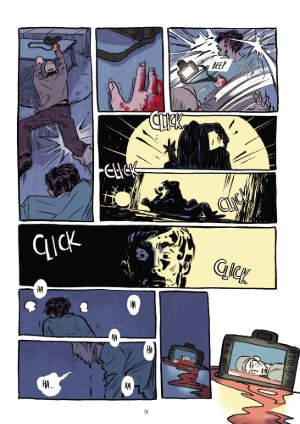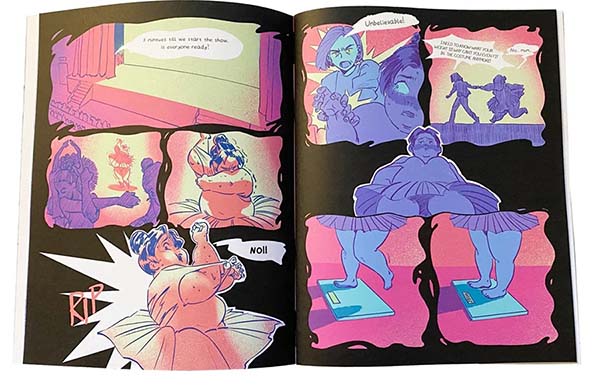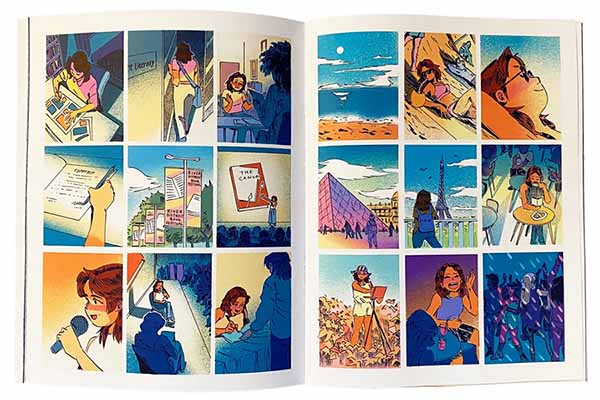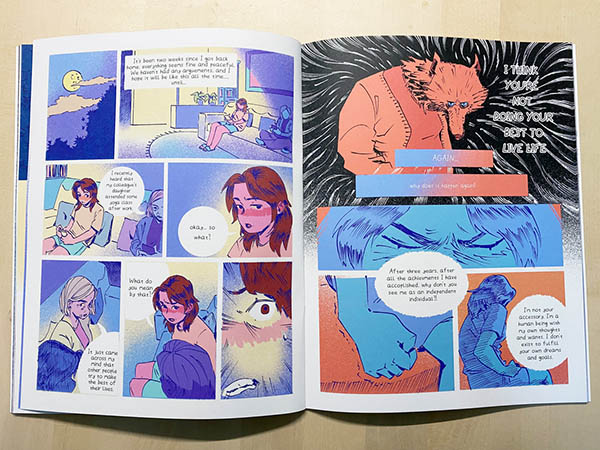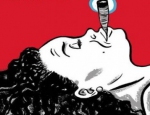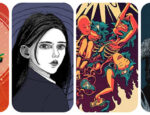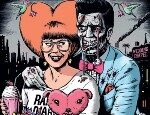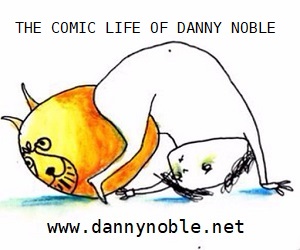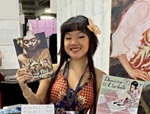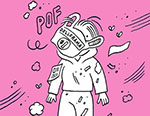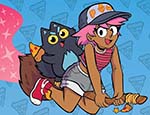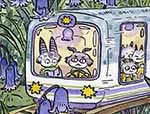THOUGHT BUBBLE MONTH 2024! Shuning Ji first came to prominence as part of SelfMadeHero’s Graphic Anthology Programme a couple of years ago. That initiative was designed to champion the work of emerging creators of colour and resulted in the anthology collection Catalyst. Earlier this year we reviewed her comic My Mum is a Wolf, a strikingly confident piece of autobiographical storytelling that focusses on a strained mother-daughter relationship. With Shuning make her debut as an exhibitor at Thought Bubble this year we took the chance to chat with her about the importance of mentorship, the responsibilities of autobiographical comics and her artistic inspirations…
 ANDY OLIVER: Let’s start by asking you to tell us a little about your artistic background and your entry point into comics?
ANDY OLIVER: Let’s start by asking you to tell us a little about your artistic background and your entry point into comics?
SHUNING JI: I’m a freelance illustrator and comic artist based in Edinburgh, with a deep passion for storytelling through comics. My love for comics started early—since the age of six, I’ve been captivated by manga and anime. One of my favorite series growing up was Case Closed (also known as Detective Conan), which inspired me to pursue a career in comics.
My professional journey took off in 2021, when I debuted as a comic artist in the anthology Catalyst. This project, part of the Graphic Anthology Programme (GAP), was published by SelfMadeHero. It was a pivotal moment for me, marking my official entry into the world of comics and solidifying my passion for the medium.
AO: Your art in your recent comic My Mum is a Wolf has a very versatile quality, shifting from dreamy symbolism to styles very rooted in reality. Who do you count as your influences and inspirations both in comics and other forms of the arts?
SHUNING JI: It all started with the idea of creating a children’s book. At the time, I had just read Michael Rosen’s Sad Book, illustrated by Quentin Blake, which tells a heartbreaking story of a father grappling with the grief of losing his son. The simplicity of the language, combined with such deep, complex emotions, left a strong impression on me. It made me realize how powerful it could be to tell a sad or difficult story from an easy, accessible perspective, allowing for a sharp emotional contrast.
At the same time, I became increasingly drawn to stories about Asian families that had started gaining attention in recent years. Films like Everything Everywhere All at Once captured my interest, not only because of the wild ride through multiple universes but also because of the deeply emotional core of the mother-daughter relationship. The struggle between the daughter and mother, and the harm caused by the generational gap and cultural traditions on both of them, really stood out to me. The film’s metaphorical approach to relationships, mental problem, and personal struggles has definitely influenced my own work.
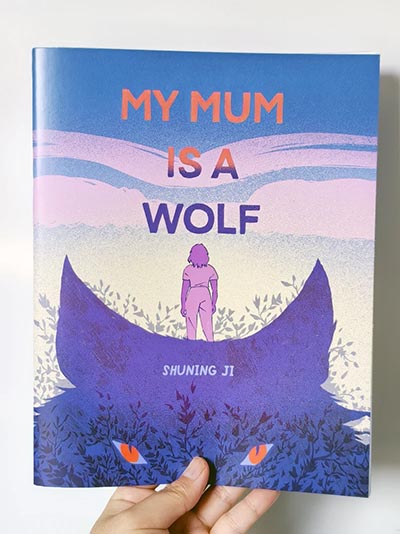
Another film that had a strong impact on me was the indie movie The Farewell. It follows a Chinese-American girl who returns to China to visit her grandmother, who has been diagnosed with terminal cancer. What I loved about the movie was how it captured the dynamics of an ordinary Chinese family, but from the perspective of someone caught between two cultures. That perspective added a fresh layer to the story, which I found inspiring.
I realize now that, though my project started with the idea of a children’s book, my inspiration has evolved significantly from the films I love. I’ve drawn so much from cinema—both the subtle, everyday moments and the grand, metaphorical ones—and these influences have shaped the direction of my comic.
AO: As mentioned, you were part of the SelfMadeHero Graphic Anthology Programme a couple of years back which looked to promote marginalised voices in comics, with your short comic ‘The Camera’ being printed in the anthology book Catalyst. What did you learn from being part of that initiative and how much of a boost was it to see your work recognised by SelfMadeHero?
SHUNING JI: During the GAP programme, I not only learned exactly what I hope to from the mentoring session-like foundational comic drawing techniques and insights into the publishing market-but also gained so much more than ever anticipated. The experience was truly irreplaceable. What might have taken me years to figure out on my own, I was able to absorb in just 12 intense weeks mentoring classes. In addition to the lessons, we were also tasked with completing an 8-page short comic each person by the end of the programme, which pushed me to apply everything I had learned in a real-world context. It was a transformative journey that shaped both my skills and my confidence as an artist.
‘The Camera’ from Catalyst
We also had the privilege of attending master talks from other well established artists. Hearing them discuss how they broke into the comic industry and developed their story ideas was both uplifting and motivating. There talks offered a glimpse into the creative process and the challenges they faces, which was both eye-opening and encouraging, giving me a clearer sense of the road ahead and the determination it takes to succeed.
I still remember the excitement and self-actualization I felt when I first saw the physical copies of Catalyst on the shelves of bookshops. It was a defining moment for me, a milestone that allowed me to finally call myself a comic artist. It definitely strengthens my passion and determination for becoming a comic artist.
AO: We recently reviewed your comic My Mum is a Wolf describing it as “an outstanding piece of visual storytelling.” Can you give readers new to the comic a brief description of its premise?
SHUNING JI: Based on my true experience, My Mum is a Wolf tells the story of a fractured relationship between a mother and daughter. The manipulative mother created a tense and toxic family atmosphere, ultimately forcing the daughter to choose her separate path. It is an emotional narrative that exposes the damaging effects of a toxic relationship between a mum and daughter. While the story is set in Chinese culture, I believe its themes are universal.
From My Mum is a Wolf
AO: Was creating this comic a cathartic experience for you? Did it feel therapeutic to explore those feelings on the comics page?
SHUNING JI: It’s hard to deny that the entire creative process was a deeply cathartic experience for me. I felt hysterical at times, especially while writing the dialogue and drawing the scenes where the daughter firmly tells her mother to stay out of her life. Reliving that trauma—particularly the memories I would rather not revisit—was both painful and unexpected.
Before creating the story, I had already explored many methods to help heal myself—reading psychological self-help books, immersing myself in fictional and non-fictional works that dealt with similar struggles, and sharing my experiences with others who had been through the same. I was constantly seeking a solution, or at least an answer, that would give me the courage I needed. I had to ensure that I was strong enough to confront those memories once again.
So yes, from the very beginning of the creative process, encouraging myself to take that first step, the act of creating became a therapeutic practice for me. The words the daughter speaks to her mother in the comic are the same words I had spoken to my mother, over and over again. Putting them on the page not only gave voice to my emotions but also strengthened my resolve to break free from the oppressive moral expectations that had heavily impacted my mum and I my entire life. Drawing those emotions down was a powerful step toward healing for me.
From My Mum is a Wolf
AO: Autobiographical comic work comes with its own issues in that it depicts real people’s lives. What do you see as the main responsibilities of this kind of storytelling given that it dramatises not just your life but other people’s?
SHUNING JI: I’m very conscious of ensuring that my work doesn’t become a product of self-admiration or self-deprecation. It might sound like nothing to do with other people’s lives, but it does.
In autobiographical work, in my opinion, it’s essential to include the perspectives, thoughts, and voices of those around us. Doing so not only enriches character development and the story but also helps maintain a sense of fact and objectivity. This way, the audience isn’t unconsciously pushed toward a particular viewpoint.
However, this approach comes with its own set of challenges. We have a responsibility to protect the privacy of others, ensuring that no harm is done that could have been avoided. Striking the right balance—between being honest and respectful—is difficult, especially when you’re sharing your life story but are limited in how much of others’ lives and perspectives you can include. It’s a delicate task to make the narrative less subjective while respecting the boundaries of those involved.
From My Mum is a
AO: Given how stunning the artwork is in My Mum is a Wolf I’d like to hear more about your artistic process. Can you tell us about that and the mediums you work in?
SHUNING JI: I usually begin by writing scripts, much like those for films, as it helps me precisely capture the emotions and dialogue I want to convey. This approach allows me to define the core of the story with clarity before moving on to visuals. Once the script is complete, I create thumbnails based on it. This has been my process for years, dating back to my university days when I would help film production students with their storyboarding.
For the artwork itself, I primarily work digitally. My iPad and Photoshop are my go-to tools, offering both flexibility and precision. Working digitally allows me to experiment freely without the fear of making irreversible mistakes. I can test colors countless times without worrying about wasting materials like pigments or paper. It’s a creative process that encourages exploration, making it easier to refine my work until it feels just right.
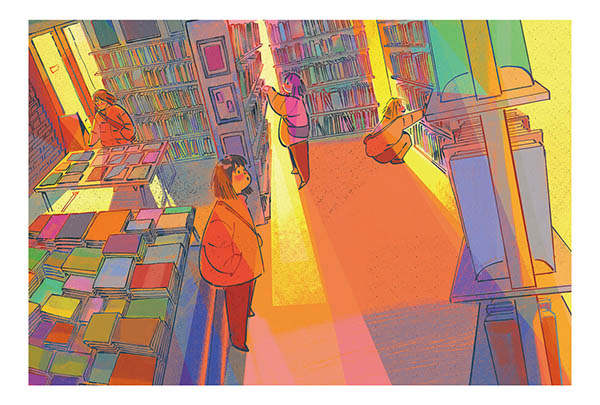
Stunning illustration work
AO: What are you working on next? What projects can we look forward to seeing from you in the near future?
SHUNING JI: I don’t have a concrete plan for my next project just yet, but I’ve been considering something more light-hearted—maybe a romantic comedy, which is a genre I read a lot growing up. I’d love to show a different, more playful side of myself… hehehe.
Well, I’m completely open to different possibilities. I’d be happy to work on picture books, children’s books and graphic novel. I’m currently looking for representation, which I hope will open up more opportunities and allow me to explore new creative directions in my art.
AO: Is there a creator or a comics project you’re particularly looking forward to checking out at Thought Bubble this year?
SHUNING JI: This is my first year exhibiting at Thought Bubble, and I don’t really know anyone yet. But I’m super excited to check everything out! If I had to pick one creator I’m really looking forward to seeing, it would be Vivian Nguyen. I’ve been a huge fan of her work online for years and love her artistic style, so I can’t wait to see her work in person!
I’m also planning to attend some of the workshops, especially the ones about comic storytelling and the cultural impact of comics. It all sounds so interesting and new to me! I can’t wait to see everyone and experience everything!
Interview by Andy Oliver
Visit Shuning Ji’s website and online store here
Shuning Ji will be at Table E2b in the Bubbleboy Hall at Thought Bubble.
Thought Bubble 2024 runs from November 11th-17th with the convention weekend taking place on the 16th-17th. More details on the Thought Bubble site here.
Read all our Thought Bubble 2024 coverage so far in one place here.
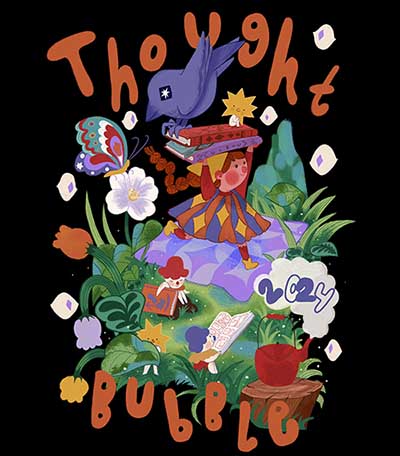
Art by Rocío Arreola Mendoza





